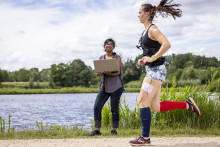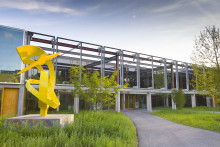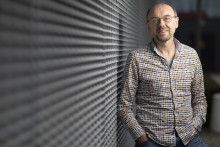Most fellow statisticians dig through existing data sets from A to Z. Basu is an exception to that rule; she, along with fellow researchers, has to collect her own data. 'We use sensors, cameras, fitness trackers and a drone to collect them. At the moment we are mainly looking at knee angles when a runner is rested, pre-fatigued or fatigued. From the preliminary results, we can already see, for example, that the knee's range of motion decreases when an athlete is fatigued. Such an observation can help to improve sports performance and to prevent injuries.'
After all, it's better to prevent than to cure. Basu, connected to the mathematical statistics group at the EEMCS faculty, and her colleagues are therefore also developing a feedback system for runners. 'For the time being, we are working with experienced runners in order to be able to monitor better. But what we really want is to create a system that works for runners at every level. We are striving to create an online system that gives feedback on different parameters through the run. So runners will know whether they need to reduce their speed, increase their stride frequency or maybe take a rest.'
The big challenge for this form of 'out of office' research is to demarcate it as well as possible. 'One sharp turn can cause the sensors to not register properly, which makes the data unusable. That is why we have collected data on a treadmill before, where the run is more regulated. We also fitted the runner with sensors, filmed the session and got the force plate data from the treadmill. Meanwhile, the subject had to run at 103 percent of her normal pace. In doing so, she slowly but surely became very tired and we obtained valuable data.'
At the moment, Basu’s main focus is still on running. In the coming years, she will also focus on other sports: rowing and volleyball. 'Running and rowing are relatively well-defined sports in terms of movement. In rowing, things already become more complex when we start investigating the movements of several rowers in the same boat. But volleyball, as a team sport where players are scattered around, is really next level. That will definitely be a challenge.'
At the same time, it is precisely the scientific approach that must make the difference compared to fitness apps, fanatical coaches and physiotherapists. 'Applying is one thing, but it is better to have a deeper understanding. This is a mathematical and data-driven approach, so this is prone to a more efficient approach.'
Basu finds it particularly exciting to see where theory and practice meet in this project, called ‘Theme Team: Health’. 'I studied in Germany, where there was a strong emphasis on theory. With good reason of course; most mathematicians work on something that will pay off in the distant future, in decades to come. This project is the other extreme. Here, we collect and process our own data and we see results almost immediately. But during my PhD, I came to appreciate the theoretical background all the more. That foundation, combined with working with real data and people, makes for an ideal total package. It feels like I have an extensive toolbox at my disposal.'
What appeals to her most about the project is the human connection. 'Other researchers who are involved work in electrical engineering and Human Media Interaction. From three totally different fields of research, we are working together on the same concrete case, while also trying to make a substantial contribution to each individual field. To some extent, the image of mathematicians is that we often stay in our own bubble, but that is absolutely not the case here. Yes, I am thoroughly enjoying it. This is how I imagine the future of science: approaching a problem together and coming up with a multi-faceted solution.'







